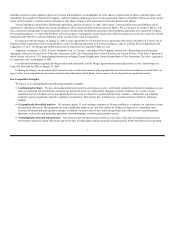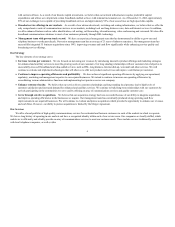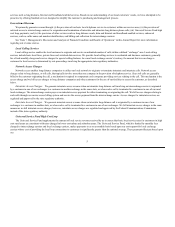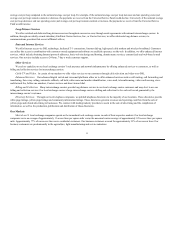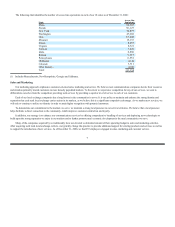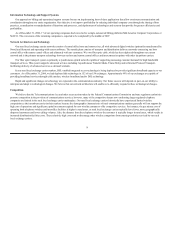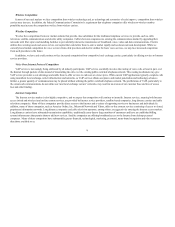FairPoint Communications 2006 Annual Report Download - page 15
Download and view the complete annual report
Please find page 15 of the 2006 FairPoint Communications annual report below. You can navigate through the pages in the report by either clicking on the pages listed below, or by using the keyword search tool below to find specific information within the annual report.
The Federal Communications Commission generally must approve in advance most transfers of control and assignments of operating authorizations by
Federal Communications Commission-regulated entities. Therefore, if we seek to acquire companies that hold Federal Communications Commission
authorizations, in most instances we will be required to seek approval from the Federal Communications Commission prior to completing those acquisitions.
The Federal Communications Commission has the authority to condition, modify, cancel, terminate or revoke operating authority for failure to comply with
applicable federal laws or rules, regulations and policies of the Federal Communications Commission. Fines or other penalties also may be imposed for such
violations. Our interstate common carrier services are also subject to nondiscrimination requirements and requirements that rates be just and reasonable.
The Federal Communications Commission has required that incumbent independent local exchange carriers that provide interstate long distance services
originating from their local exchange service territories must do so in accordance with “structural separation” rules. These rules require that our long distance
affiliates (i) maintain separate books of account, (ii) not own transmission or switching facilities jointly with the local exchange affiliate, and (iii) acquire any
services from its affiliated local exchange telephone company at tariffed rates, terms and conditions. The Federal Communications Commission has initiated a
rulemaking proceeding to examine whether there is a continuing need for such requirements; however, we cannot predict the outcome of that proceeding.
State Regulation
Most states have some form of certification requirement that requires providers of communications services to obtain authority from the state regulatory
commission prior to offering common carrier services within the state. Most of our rural local exchange companies operate as the incumbent local telephone
company in the states in which they operate and are certified in those states to provide local telephone services. State regulatory commissions generally regulate
the rates incumbent local exchange carriers charge for intrastate services, including rates for intrastate access services paid by providers of intrastate long
distance services. Although the Federal Communications Commission has preempted certain state regulations pursuant to the Telecommunications Act, states
have retained authority to impose requirements on carriers necessary to preserve universal service, protect public safety and welfare, ensure quality of service
and protect consumers. For instance, incumbent local exchange carriers must file tariffs setting forth the terms, conditions and prices for their intrastate
services, and such tariffs may be challenged by third parties. From time to time, states conduct rate cases or “earnings” reviews. These reviews may result in
the disallowance of certain investments or expenses for ratemaking purposes.
Under the Telecommunications Act, state regulatory commissions have jurisdiction to arbitrate and review interconnection disputes and agreements
between incumbent local exchange carriers and competitive local exchange carriers, in accordance with rules set by the Federal Communications Commission.
State regulatory commissions may also formulate rules regarding fees imposed on providers of communications services within their respective states to
support state universal service programs. States often require prior approvals or notifications for certain acquisitions and transfers of assets, customers, or
ownership of regulated entities. Therefore, in most instances we will be required to seek state approval prior to completing new acquisitions of rural local
exchange carriers. States generally retain the right to sanction a carrier or to revoke certifications if a carrier materially violates relevant laws and/or regulations.
Local Government Authorizations
We may be required to obtain from municipal authorities permits for street opening and construction or operating franchises to install and expand
facilities in certain rural and small urban communities. Some of these franchises may require the payment of franchise fees. We have obtained such municipal
franchises as were required. In some areas, we do not need to obtain such permits or franchises because the
13


